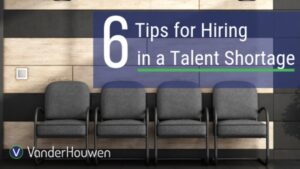What to Do When You Receive a Counter-Offer
As a job seeker, you know that the job market is constantly changing. In September 2017 when I wrote the article What to Do When Your Top Candidate Receives a Counter-Offer, the market was tight and equipped candidates were hard for hiring teams to find. Fast forward to today: now the market has become even more competitive and the list of qualified candidates has shortened. Since companies are working harder to find the perfect candidate to fit their open roles, it’s not uncommon for top candidates to receive multiple offers during their job search.
So, you’ve received a counter-offer. What do you do now? Determining the best next step in your career can be a tough and emotional decision, especially when you have to choose between two great offers from two different businesses. Over the past year and a half, I’ve learned a lot through the successes and failures of some of the best candidates and companies navigating tricky counter-offer situations. A great example comes from two candidates that I worked with for an extended period of time. I had strong relationships with both, and a solid understanding of their motivations in their search and where they wanted their career to go. Both received offers, and then counter-offers, in their job search.
Deciding between an exciting role and a career building opportunity
The first scenario involved a candidate I had previously placed. She received an offer from a company that she had wanted to work at for years—it was her bucket list company and her ideal position. However, two days before receiving the offer, she had received another offer for a totally different type of company. It was a role at a hip, trendy startup, with unique benefits, remote work opportunities, and the overall ‘cool’ factor that so many startups companies have. She had already accepted the offer before receiving a competitive, and even better, offer from her dream company. She didn’t know what to do. As a recruiter, I knew it was my job to help her decision process and assist her with weighing the pros and cons. Which position was going to help her advance her career and put her in a stronger spot going forward? I invited her to my office for a sit down to talk in-depth and weigh the pros and cons of both offers. It wasn’t an easy conversation. It was emotional, as we really dug into the core of her motivations, goals, and career path. When we got into it, we collectively realized that she didn’t see her future with the cool company with the flexibility and the fun environment—instead, she envisioned a future that involved advancing her career and developing new skills. As we talked, we knew that this type of career growth wasn’t going to happen at the startup. What she wanted long-term had to happen at an established company, with growth opportunities and other departments where there was a proven history of internal promotion. After our conversation, she accepted the offer with her dream company and she stepped away from the startup opportunity.Deciding between a current role and a promotion at a new company
The same week that I had that candidate accept her dream offer, I had another candidate decline an offer. This was a candidate that I worked with for years and had a good relationship with. He called me out of the blue when his current company was having some financial struggles and wanted to exit before it got any worse. I set up an interview for him for a similar role with a great company, and then we heard nothing back. Finally, a month later the company decided to send him a job offer. Since the hiring process had taken so long, when the candidate received the offer 30 days later, he was hesitant to accept the position. By this time, he had written off the company as an option. This serves as a good reminder to clients to stay engaged, as it can be hard to revive an offer someone has written off. When he thought about his own career, this company and role were going to be a lateral move in terms of compensation, but a step up in title and duties. Plus, in the last 30 days, his company had become more stable which increased his confidence in his role. Though money wasn’t his primary motivator, he was hesitant to leave his current role for the same salary. After several days of back and forth, he ultimately turned down the new offer. His current employer submitted a counter-offer for more compensation and the same title the new company was offering. However, 45 days after his promotion, he expressed regret in accepting the counter-offer at his current company and wanted help finding another role. Though the salary and a title change felt like a good step forward in his current job, his original concerns returned—he was worried about the stability and viability of the company. Today, he’s no longer with the company after finding another role.Our learnings? Take time to understand what you want out of a job and your career
Though cool benefits and a stronger compensation package may sound like great perks, for many candidates that may not lead to a fulfilling career. As you’re thinking about leaving your current role or deciding between multiple job offers, carefully consider your motivations, long-term goals, and organizational fit. Are you looking for stability and upward mobility? Maybe you’d find a better fit at a larger, established company. Are you the type of person who is motivated by acquiring new skills? A company with a strong professional development program could better align with your goals. Are you inspired by a fast-paced environment? A startup could be a great option for you to try on a few different hats. Throughout the job hunt, keep revisiting your professional goals and motivations. By using them as your North Star to guide you through the types of jobs you apply for and the job offers you accept, you are more likely to land in a position that you’ll be happy with for the long-term. As a recruiter, it’s my job to help candidates uncover their professional goals and guide them towards the career path of their dreams. When it comes to the job search, a good recruiter is a great resource because they always have the candidate’s best interests, goals, and needs in mind.Do you need help discovering the next step in your career? Contact VanderHouwen today to get expertise and advice before making your next big career decision!































































































































